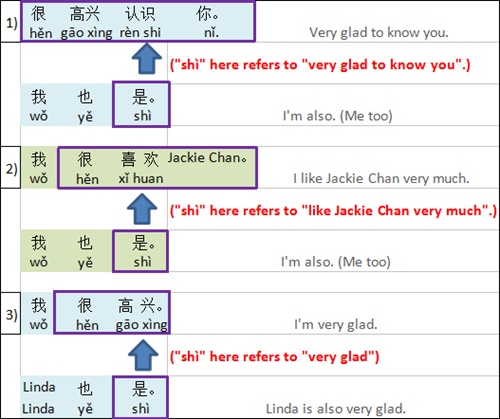| 很 高 兴 认 识 你。 |
| Hěn gāo xìng rèn shi nǐ | Very glad to know you. |
| 我 也 很 高兴 认识 你。 |
| Wǒ yě hěn gāo xìng rèn shi nǐ | I'm also very glad to know you. |
Dialogue
Note: "How are you" greetings in Chinese.
| A: | 很 | 高 | 兴 | 认 | 识 | 你 | 。 | | Hěn | gāo | xìng | rèn | shi | nǐ | . |
Very glad to know you. | Download | |
| B: | 我 | 也 | 很 | 高 | 兴 | 认 | 识 | 你 | 。 | | Wǒ | yě | hěn | gāo | xìng | rèn | shi | nǐ | . |
I'm also very glad to know you. | Download | |
Vocabulary
| 高兴 | gāo xìng | adj. glad | |
| 认识 | rèn shi | v. to know | |
Expansion
Ohter common greatings: How to say "How are you", "Good Evening"in Chinese
Grammar
| How to express "Me too" in Chinese |
We know that in English, we can simply use "Me too" rather than repeat the whole sentence. And in Chinese we have the same usage, which is to use "wǒ +yě+ shì "(literally I am also). 是 (Shì ) means "to be" in Chinese (such as am, is, are) which will be taught in Lesson 6, and "wǒ +yě+ shì "can refer to whatever the speaker said before as long as you agree with him or her. For example: |
| 很 | 高兴 | 认识 | 你 | 。 | | hěn | gāo xìng | rèn shi | nǐ | . |
Very glad to know you. | Download | |
| 我 | 也 | 是。 | | | wǒ | yě | shì. | ("shì" here refers to "very glad to know you") |
I'm also. (Me too) | Download | |
| 我 | 很 | 喜欢 | Jackie Chan。 | | wǒ | hěn | xǐ huan | Jackie Chan。 |
I like Jackie Chan very much. | Download | |
| 我 | 也 | 是。 | | | wǒ | yě | shì. | ("shì" here refers to "like Jackie Chan very much") |
I'm also. (Me too) | Download | |
| I'm very glad. | Download | |
| Linda | 也 | 是。 | | | Linda | yě | shì. | ("shì" here refers to "very glad") |
Linda is also very glad. | Download | |
